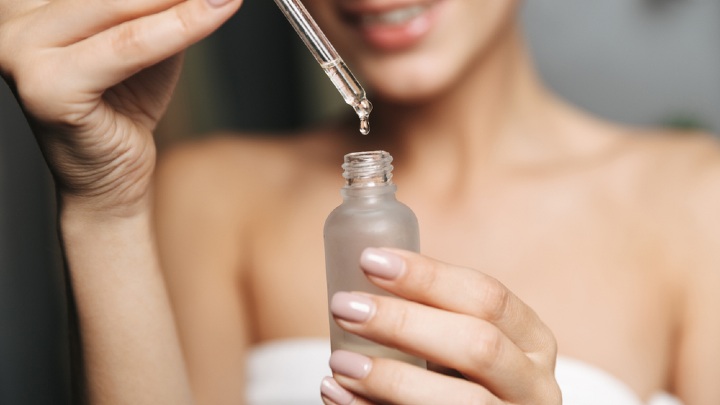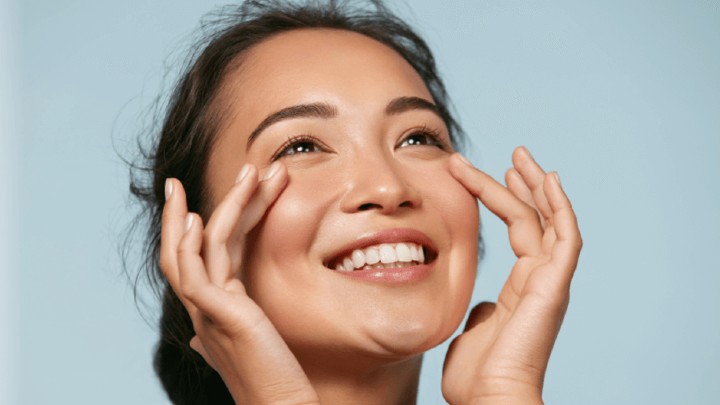Does vitamin C serum lighten skin? Whether you’re looking for a way to fade dark spots or you simply want to brighten your complexion, you’re in the right place.
Vitamin C serum can lighten any skin type, even the most sensitive one. It will also fade away any hyperpigmentation spots, leading to a brighter tone and texture.
But is it worth the hype? Is vitamin C serum safe for the skin? And can you try this product with other skin-lightening treatments?
This article covers everything you need to know about using vitamin C serum for skin lightening. Read on to find out.
What is vitamin C serum?
“Vitamin C serum is a skincare product that contains vitamin C, also called L-ascorbic acid or L-Ascorbate,” says Dr. Jeanine B. Downie, a board-certified dermatologist in New Jersey.
“When applied to the skin, vitamin C serum goes into the bloodstream where it is used by cells for its antioxidant properties,” she says.
The benefits of vitamin C serum include skin brightening, increased elasticity, reduced wrinkles, and protection from sun damage. Vitamin C serum also helps with acne scars and other kinds of hyperpigmentation.
The downside is that vitamin C oxidizes when exposed to air, so you have to keep it refrigerated and use it quickly. Depending on the concentration of vitamin C in a particular serum, it may not be very effective after 5-7 months of use.
“To get the most out of Vitamin C in your skincare routine, you should choose a serum that contains L-ascorbic acid; this is the purest form of Vitamin C and will give you the best results,” Downie advises.
Does vitamin C serum lighten skin?
“The answer is yes,” says Dr. Amy Wechsler, a New-York based dermatologist.
“Vitamin C serum help lighten skin by decreasing the production of melanin in the skin (melanin is the substance responsible for skin pigmentation).”
Vitamin C serum also exfoliates dead skin cells and protects the skin from free radicals. Free radicals develop when you expose your body to environmental stressors like sun rays, chemicals, and pollution.
They also happen naturally in your body as part of metabolism — all living things produce free radicals as part of life. However, these free radicals are extremely harmful and can damage skin cells, causing skin discolorations such as brown spots, sunspots, and dark spots.
“By reducing melanin production, exfoliating dead skin cells, and protecting your skin from free radicals, this serum helps your skin look more radiant and even in tone,” Dr. Wechsler says.
While there are other topical treatments for skin lightening, using vitamin C serum is a great way to get that fresh natural glowing skin.
Other benefits of vitamin C serum for skin
- It is an antioxidant. In other words, it serves as a shield against free radicals that can cause cellular damage and trigger wrinkles.
- It makes a good skin-firming treatment. Vitamin C serum helps stimulate collagen production, a protein that repairs aging skin and keeps it firm.
- It helps protect your skin from sun damage. Vitamin C neutralizes harmful ultraviolet rays from the sun by changing them into harmless byproducts.
- It improves blood flow. Vitamin C does this by enhancing blood circulation in the capillaries that feed your skin with nutrients and oxygen.
- It increases moisture content. Vitamin C serum also helps prevent the evaporation of water from the skin, thereby locking moisture in and preventing dehydration.
- It can help treat acne breakouts. Vitamin C helps reduce inflammation caused by acne, which means less redness or swelling, and fewer pus-filled lesions.
How to use vitamin C serum for skin lightening
You can use vitamin C serum for skin lightening on its own or in combination with other treatments. For example, you can use it with treatments like microdermabrasion or chemical peels.
This will help improve the penetration of vitamin C into the deeper layers of your skin while removing dead and damaged cells at the same time.
“Some people have had great results using vitamin C serum with microdermabrasion and chemical peels. However, you should always consult your dermatologist first and do a patch test to make sure you don’t react negatively to it,” says Downie.
Usage instructions
Apply 2-3 drops of vitamin C serum to your skin every day after cleansing your face and before using any moisturizer or sunscreen.
You should never apply a vitamin C serum or any other skincare product in your eyes, warns Wechsler. “When using vitamin C serum, especially around the eye area, make sure to pat it into your skin and not apply it near your eyes,” she says.
Use just enough to cover your entire face and allow it to dry before applying anything else. If you’ve never tried vitamin C serum before, make sure to do a patch test before adding it to your skincare routine.
Are there any side effects?
When applied to the skin, vitamin C serum dissolves dead skin cells, which cause redness or sensitivity in some people. Vitamin C serum may also increase photosensitivity, meaning you can burn more easily when out in the sun.
Another major concern is that vitamin C can interact with certain ingredients in other skincare products to create an acid, which might lead to chemical burns.
To avoid this risk, always make sure any products you use with vitamin C serum are free of these ingredients:
- Lactic acid
- Salicylic acid
- Glycolic acid
- Niacinamide
- Retinol or retinoid compounds
How do you choose a vitamin C serum?
There are many types of serums available. It can be hard to choose the right one for your skin type. Below are some tips to help you pick one:
- The higher the percentage, the better. Go for 10 percent or higher (but no more than 20 percent).
- Look for serums that contain complementary ingredients like vitamin E and hyaluronic acid. These ingredients will help hydrate your skin and minimize fine lines and wrinkles as well.
- Avoid products that contain fragrances, essential oils, and other ingredients that can irritate sensitive skin.
- Choose a serum that comes in an airless pump container to prevent oxidation from air exposure.
- Look at the packaging of your product and make sure it says “pH balanced.” If it doesn’t say that, it may be outside of the ideal pH range and could cause increased sun sensitivity.
- If you have sensitive skin, make sure the serum contains magnesium ascorbyl phosphate. This form of vitamin C is gentle, so it doesn’t cause irritations like other forms of vitamin C.
FAQs

Is vitamin C serum good for aging skin?
Yes, it is.
Vitamin C is one of the most effective anti-aging ingredients available today. Not only does it help reduce aging signs, but it can also prevent future skin problems from occurring.
If you want to use vitamin C serum for aging skin, you should pick one with a high concentration of vitamin C. Anything around 15% should do the trick but if you can find a product that has more than that, go for it.
How much do vitamin C serums cost?
$20 to $50.
Although it depends on which brand you choose, it could range from $20 to $50 for one bottle of serum.
One bottle of serum will last you anywhere from three months to a year, depending on how much you use each day, so you’re getting your money’s worth.
How long does it take vitamin C serum to work?
4-6 weeks.
On average, it can take anywhere between 4 weeks for vitamin C serum to show results. To make sure your serum is effective, you will need to apply it daily with a 10% vitamin C concentration or higher.
If you’re sensitive to vitamin C in its purest form (ascorbic acid), look for serums that contain other types of vitamin C, like magnesium ascorbyl phosphate (MAP) and sodium ascorbate.
Takeaway
To wrap it up, vitamin C serum can do wonders for your skin. Not only does it lighten skin, but it’s also a great way to get rid of signs of aging, like fine lines and wrinkles.
You can use this serum alone or with other treatments like microdermabrasion or chemical peels. The application is simple — just dab a few drops on clean skin before applying your moisturizer or any other products.
Depending on the type and quality of the ingredients in your serum, you should get results anywhere between four to six weeks of daily usage.
Thanks for reading.
Find more helpful beauty tips here on MBGON.
